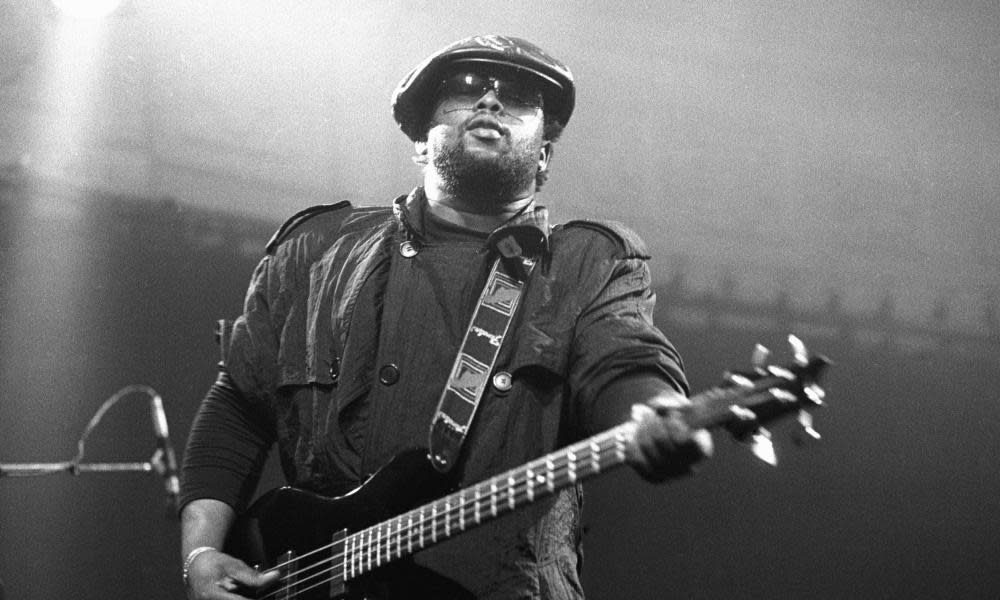Robbie Shakespeare obituary

One of Jamaica’s greatest bass players who was half of the famous reggae duo Sly and Robbie
Robbie Shakespeare, who has died aged 68 following kidney surgery, was the best known and most highly regarded bass player in Jamaica for a span of more than three decades from the late 1970s onwards. His drum and bass partnership with Sly Dunbar provided the rhythmic underlay – as Sly and Robbie – for many of the best works of reggae by artists such as Gregory Isaacs, Peter Tosh, Bunny Wailer, Black Uhuru and Burning Spear.
Sly and Robbie’s creative peak came in the 80s, when they were the golden duo of reggae, pushing forwards with their creativity and exploring a more digital sound that sometimes took their drum and bass foundations into funkier, disco-like territory, while retaining a strong roots feel.
After they branched out to provide the rhythm section for several Grace Jones albums, their influence began to stretch well beyond reggae, and in the later part of his career Shakespeare was much in demand as a player and producer with big names in the music business, including Mick Jagger, Yoko Ono, Sinéad O’Connor and Bob Dylan. In 2020 he was named at No 17 in Rolling Stone magazine’s list of the greatest bassists of all time.
Born into a musical family in Kingston, Jamaica, Shakespeare first learned to play acoustic guitar, but took up the bass after an encounter at his family home with Aston “Family Man” Barrett, one of the pre-eminent Jamaican session musicians of the 60s and later the bass player and musical arranger for Bob Marley and the Wailers.
Barrett helped Shakespeare to learn the bass, but also took him under his wing, allowing the younger man to shadow him on sessions and putting him forward for recording work once his playing was up to speed.
Shakespeare had first come across Dunbar in the early 70s when playing at the Evil People club in Kingston. Dunbar was a resident musician at the nearby Tit for Tat venue, and whenever either of them had a break, they would slip over to the other club to watch what was going on. Impressed by Dunbar’s musicianship, Shakespeare told the producer Bunny Lee about his discovery, and the two of them ended up playing together as part of a studio band.

Both regarded their partnership as a gift from the heavens. “From day one we had that special chemistry,” said Shakespeare. “Musically we’d have to set up a special channel to God to ask him why what we play always comes out right.” For his part Dunbar noted that “from the first time we played together we clicked musically. It was like magic. He knew what I was going to do and I knew what he was going to do.”
Apart from their musical synchronicity, the pair were also remarkably close friends, as well as a good temperamental match. Dunbar, the more laidback of the two, often applied a brake on Shakespeare’s demanding, forceful personality, while Shakespeare helped the two of them to stand up to any music business murkiness. They rarely parted for any length of time, spent almost every day in each other’s company and claimed never to have had a fight or quarrel.
“It feels like a bond, even more than a marriage,” said Dunbar in 1997. “We just relax together, and there’s no ego.” Shakespeare and his wife, Marian, were near neighbours of Dunbar and his wife, Natasha.
Forming their own independent production company and record label, Taxi, in 1974, within two years Sly and Robbie had already become one of Jamaica’s most celebrated and prolific rhythm sections, their work encompassing not just sessions with the Revolutionaries and Aggrovator bands but, from 1975, as the mainstay of the Peter Tosh band, with whom Shakespeare played on six albums, including Legalize It (1976) and Equal Rights (1977). He was also on the classic 1976 Mighty Diamonds’ album Right Time, and contributed (without Dunbar) to Bunny Wailer’s Blackheart Man in the same year.
Perhaps the quintessential Sly and Robbie sound was delivered with Black Uhuru, with whom they played from 1979 to 1986, including on the album Sinsemilla (1980), the title track of which showcases the pair in all their glory. That album also began to make them influential in reggae’s move towards digital instrumentation, epitomised by their jagged, staccato treatment of Murder She Wrote by Chaka Demus & Pliers in 1993.
Shakespeare’s switch into working with musicians outside reggae had begun as early as 1980, when he and Dunbar were drafted in to play on Jones’s album Warm Leatherette. He subsequently provided a number of memorable bass lines for Jones songs such as My Jamaican Guy, Pull Up to the Bumper and Private Life, and the association brought in much more work, both as a producer and bass player, with other high-profile artists.
He was involved with three Dylan albums in the mid-80s (Infidels, Empire Burlesque and Down in the Groove), with Jagger’s 1985 album She’s the Boss, Ono’s Starpeace in the same year, Jackson Browne’s World in Motion in 1989, and two albums by O’Connor in the 2000s. Among other musicians he recorded with were Ian Dury, Herbie Hancock, Joan Armatrading and Sting.
Sly and Robbie also released six albums of their own between 1985 and 2014, and their musical and personal friendship endured to the end. “I don’t even want to think about what it would be like if Robbie wasn’t here,” said Dunbar. “We’ve got so much history between us, you can’t replace that.”
• Robbie (Robert Warren Dale) Shakespeare, musician, born 27 September 1953; died 8 December 2021

 Yahoo News
Yahoo News 
